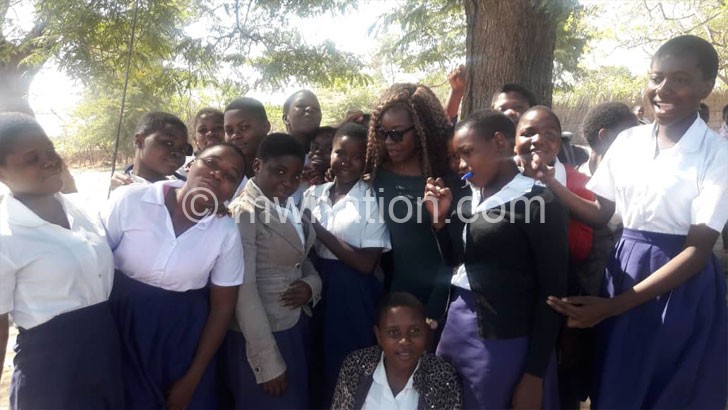jacqueline banda: employing the youth to support families
After graduating with a Bachelor of Business Administration at Shimla University in India in 2017, she came back home to a tight job market, making it difficult for her to put her attained skills to good use.
But coming from Mangochi, which is one of the hot spots for early marriages in the country, Jacqueline Banda is lucky that at 26, she still does not have children and is not yet married.
And in her family of four girls, she is the only one who graduated.
“I am determined about what I want in life. I have sisters who have children and seeing how our family is, having a baby would mean that I am not loving my parents and won’t help put an end to poverty because our problems would be piling up. So, I decided to be focused and work hard. Even most of the friends I went to school with in Mangochi are either married or have children,” Jacqueline says.

Born on April 7 1994 at Mangochi District Hospital, she grew up within the district.
After her primary and secondary school studies, she studied business management at Pact College.
There Jacqueline attained an advanced diploma from the Association of Business Executives (ABE) before proceeding as a mature entry student at Shimla University.
In college, she was involved in a lot of education empowerment activities for girls.
At the time, she even represented Malawi at the Commonwealth Youth Summit that was held in New Delhi, India in February 2017.
“I was the first Malawian woman to attend the summit. And with low literacy rates in the country, my focus was on children in the village,” says the second born of four girls.
Jacqueline’s presentation at the summit focused on the challenges they face and what the government is doing, as well as what citizens are supposed to do by 2023.
Mangochi was one of the districts I used as an example, because being a tourist destination, education is not a necessity for most girls.
Upon completing her studies, she founded Awaken Mangochi Girls Initiative, a community-based organisation (CBO) through which she would visit schools to empower girls and talk to parents to help them change their mindsets.
The idea was to stop parents from taking girls as liabilities, but assets.
“The motive was to increase the number of educated girls in Mangochi and to change parents’ mindset that girls are supposed to get married and make babies; and that education is for boys because they will become heads of their houses,” she says.
She continues: “My heart will be at ease when I see more girls from Mangochi holding good positions in the job market and when parents start encouraging girls to go to school rather than starting their own homes when they are still young.”
Jacqueline admits it has been a huge challenge convincing parents that girls need to get education, as most parents feel that no one can tell them what to do with their children.
Still she managed to convince some after laying out the benefits they will enjoy when their daughter is educated.
She was also paying fees for few students in secondary school, but when her employment contract ended, she had no means of helping the children. She reached out to her friends who assisted her with the fees until the children completed their studies.
“It pained me that they did not do well in the Malawi School Certificate of Education (MSCE) examinations, but I could not afford to take them back to school because I was not working,” she explains.
Unfortunately, the CBO died a natural death when Jacqueline went to live in Mzuzu where she worked as an intern with the Malawi Revenue Authority (MRA).
However, when her contract came to an end in April this year, she had no idea what she would be doing and the novel Covid-19 pandemic made things worse in terms of opportunities—not only for her, but for other youth as well.
She explains: “The youth have a lot of needs and our parents cannot afford to provide for all of them. I once worked as a shop keeper in 2011 after high school to support my needs where my parents could not provide although I was just working to pass time. After I graduated, I realised how difficult it is to find a good job. And that at the end of the day, people get involved in bad behaviour just to kill stress.”
And now with the Covid-19 pandemic amidst us, she thought long and hard of what she could do to engage the youth so that they should not end up on the bad road.
“I thought of creating something to support me, through which I would also create jobs for the youth so that with the little they get, they should also support their families and themselves,” she says.
So, she has started a chilli making venture which currently has 13 youths employed both in processing and cultivation.
“Chilli suppliers always opted to sell to bulk buyers as opposed to smaller scale businesses like us. This motivated me to start cultivating my own chilli. My grandfather has given me a piece of land at my home village where I have 10 employees tending the garden. I am cultivating chilli, onions and sugarcane,” says the young woman who comes from Chinana Village, Traditional Authority Bwananyambi in Mangochi.
Her biggest inspiration is hearing girls and young women say she inspires them.
“Every time when I want to give up, I remember those words and I put an effort, because looking back to where I am coming from; and looking at where I am now and where I am going, I can say that I am not contented yet, but I like the little progress I have made,” says Jacqueline who in her free time likes cycling, hiking, spending time at the beach and listening to music.



